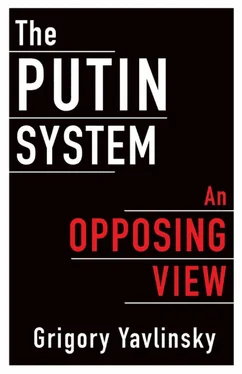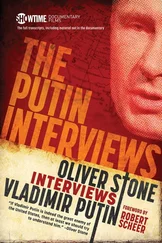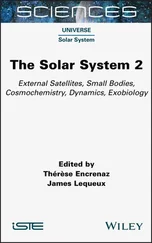Russia’s peripheral authoritarianism perceived developments in Ukraine as an assault upon the essence of Russia’s existing political system. Yet the Kremlin did not dare to defend the Eurasianist system directly; instead, it proclaimed itself to be a fighter for Russia’s interests. It demonstrated this, first, through the illegal annexation of Crimea, which was bound to increase its popularity, and second, through the defense of Russian speakers against Ukrainian nationalists (widely known in Russia as “Banderists,” after Stepan Bandera, the leader of one of the most militant nationalist groups in Ukraine during World War II).
Even so, the gist of the actions undertaken by the Kremlin was related less to Crimea (which is just an additional trophy) than to the preservation of the power of the ruling circle in Russia and to the defense of Russia’s authoritarian peripheral-type system against an onslaught. (And this was the second such onslaught, at that. The first was the exposure of the fraud perpetrated in the course of Putin’s reelection to the presidency in 2004.) This was also the case in the Soviet invasion of Hungary in 1956 and of Czechoslovakia in 1968; these invasions were not about territory but rather were a response to the countries’ rise against the authoritarian system of rule. This is precisely why Russia was irreconcilably against Ukraine’s association with the EU in any shape or form.
Moreover, Russia’s ruling elite set upon the task of stimulating the process of destruction of Ukrainian statehood and proving to the rest of the world that Ukraine in its present borders is a failed state. Ultimately, Russia’s ruling elite has been seeking to redraw/partition Ukrainian territory and to chop off Crimea and Eastern and Southern Ukraine so that Russia can take them over, one way or another. This does not have to be accomplished through annexation; instead, it can be achieved through the creation of a “buffer zone,” in some shape and form, between Russia and the West. It is conceivable that Western Ukraine and a part of Central Ukraine may then be able to exist as an independent state, and that Russia will even put up with their accession to the EU and possibly even to NATO (depending on how this “operation” turns out and what kind of territorial configuration emerges as a result.)
In any case, the Kremlin’s operation, “Ukraine-2014,” was aimed at reinforcing the non-European, “Eurasianist” character of the Russian state. It is a state that interprets human rights and international law in its own way, that assumes the role of an adversary of the West, and that ultimately maintains all the principal components of the “sovereign” criminal-oligarchical system of governance created after 1991. In the event that this operation is a success, it is quite possible, and even probable, that its zone will be extended into other former Soviet territories as well.
Regardless of the future course of events, however, Russia’s slide toward anti-European policies has already created a novel and toxic environment for all of its neighbors, producing among them a strong desire to distance themselves from it as much as possible. Its persistent promotion of quasi-alternative (in fact, nonexistent) Eurasianist values results in a conspicuous disregard for civil and political rights, in a rejection of the principle of citizens’ equality before the law, in a weakening of the separation of powers and the rule of law, in the nurturing of an oligarchical system of property ownership, and in a lack of competition in Russia’s politics and economy.
Nearly every country that neighbors Russia has significant pro-European forces that are countering the Kremlin’s plans to maintain its tight grip upon these countries. Therefore, by its refusal to move in the European direction, Russia gives rise to an extensive geographic belt of instability. In the near future, Russia has a considerable capacity to generate instability in Ukraine by using its economic leverage (Ukraine’s dependence upon Russian markets and energy resources) and by fueling secessionism through infusions of money and media propaganda. Because of this, the prospects of a European future for Russia are among the key issues for Ukraine and for the post-Soviet region as a whole.
Only a shared pan-European vision can be commensurate with Russia’s intent while also being capable of exciting its people rather than scaring them off. The concept of a “Greater Europe”—from Lisbon to Vladivostok—undoubtedly holds such a promise. And this is not just lofty rhetoric or hot air. This is a weighty, effective approach, and it is the only practical alternative to both the blind alley of steady decomposition into which Russia’s society is being driven today and the “new” but actually old myth about nationalism as the only possible driving force of a liberal revolution.
For Europe (and for Russia and Ukraine as its inherent parts), self-identification with this notion of a Greater Europe and consistent efforts to put it into practice in the economy, in politics, and in military strategy are the only means to survive and to rise to a new, significantly higher level in global affairs and in economic competition with North America and Southeast Asia in the twenty-first century. On its own, Europe will never be able to succeed in this regard—and certainly the Eurasianist Russia that rejects the West and considers it a threat will not.
Overall, Europe can be strong and promising only if the European way of life keeps expanding and continues to transcend its present boundaries. If Europe stops growing and decides that the political definition of Europe is limited by the borders of the former Soviet Union after the accession of the Baltic states to the EU, then such a Europe, deprived of the energy of moving forward, will become increasingly bureaucratic, frozen, and prone to decay. Moreover, Russia and Ukraine, with their cultural and historical experience, their traditions, and their power of creativity, which they have preserved against all odds, can play a positive role in addressing many of the challenges that Europe faces.
RUSSIA AS A “POLE” IN A MULTIPOLAR WORLD: THE NEW IDEOLOGICAL FETISH
As I noted in chapter 3, a classical authoritarian power tends not to be overly concerned with developing an integrated universal ideology; instead, it focuses on control over the resources of financial and administrative power, without seeking to rule the minds and thoughts of the population it governs. It does not pay that much attention to what the population thinks, and when it does, this attention is usually limited to a bunch of platitudes loudly proclaimed as the official ideology—typically along the lines of being on the side of everything that people view as good and being against all evil.
This principle is undoubtedly true when an autocracy is in its formative stage or is at its peak and is confident enough to have no need for an additional prop in the form of a universal and mandatory ideology. This is also the safer course, as the use of such an ideology as a tool of governance carries with it not only potential benefits but also certain complications and risks. Ideologies often invoke deeply held feelings and instincts that are easy to arouse but extremely difficult to control or tame when government interests require it.
Yet, in the section of that chapter titled “In Search of an Ideology,” I noted that the period when Russia’s present-day authoritarian regime was thriving and exuding self-confidence did not last very long. By approximately 2010, it became plain to see that the prior rapid and tangible growth of Russians’ incomes could not be sustained. Simultaneously, the opportunities for the elite to appropriate and distribute a hefty bureaucratic rent reached a hard limit as, in fact, the amounts of this rent stopped growing.
Читать дальше












